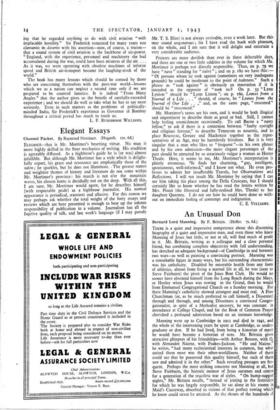Elegant Essays
Channel Packet. By Raymond Mortimer. (Hogarth. I2S. 6d.) ELEGANCE—that is Mr. Mortimer's besetting virtue. No man is more highly skilled in the finer mechanics of writing. His erudition is agreeably diffused. As a highbrow's guide he is (or was) almost infallible. But although Mr. Mortimer has a style which is delightfully expert, his grace and resonance are emphatically those of the salon ; he sparkles, but he does not illuminate. . The greater names and weightier themes of history and literature do not come within Mr. Mortimer's province : his march is not o'er the mountain waves, his chosen home is decidedly not on the deep. With all this, I am sure, Mr. Mortimer would agree, for he describes himself (with respectable pride) as a highbrow journalist. His normal appearance is periodical, transient and allusive. For this reason we may perhaps ask whether the total weight of the forty essays and reviews which are here presented is enough to bear up the solemn responsibility of publication in a volume. Journalism has all the fugitive quality of talk, and last week's language (if I may parody
Mr. T. S. Eliot) is not always revivable, even a week later. But this may sound ungenerous; for I have read the book with pleasure, on the whole, and I am sure that it will delight and entertain a very considerable audience.
Printers are more devilish than ever in these delectable days, and there are one or two little oddities in the volume for which Mr. Mortimer is perhaps not directly responsible. Thus, on p. 79 we have " nave " standing for " naive " ; and on p. 18o we have this :— " Of persons whom lie took against (sometimes on very inadequate grounds) he could be intolerant to the point of rudeness." Such a phrase as "took against" is obviously an innovation if it is intended as the opposite of "took to.-' 3 On p. 33 "Lynn Lynton should be "Lynn Linton "; on p. 16o, Leaves from a 7ournal of a Life . . ." should, of course, be "Leaves from the 7ournal of Our Life . . .," and, on the same page, " ensconed" should be "ensconced."
Mr. Mortimer's tastes are his own, and it would be both illogical and impertinent to describe them as good or bad. Still, I cannot help feeling astonishment occasionally. To call Bacon a "nasty fellow," to ask if there is a connexion between "faulty eyesight and religious fervour," to describe Tennyson as neurotic, and to place Rousseau, Greuze and Mackenzie together as the representatives of an Age, may be harmlessly frivolous. But it is very singular that a man who likes to "frequent "—in his own phrase and by his own admission—the more elegant personages of the past should be attracted by so atrociously vulgar a woman as Hester Thrale. Here, it seems to me, Mr. Mortimer's interpretation is plainly erroneous. Tle finds her charming, "gay, intelligent, spontaneous, well-informed," and I know not what. He even professes to admire her insufferable Travels, her Observations and Reflections. I will not insult Mr. Mortimer by saying that I can see him taking his place among the Della Cruscans, but I should certainly like to know whether he has read the letters written by Mrs. Piozzi (the liberated and fully-realised Mrs. Thrale) to her daughter Queeney. I do not see how he could have done so without an immediate feeling of contempt and indignation.
C. E. VULLIAMY.






















 Previous page
Previous page